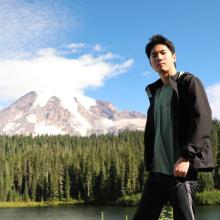After completing his PhD and an MS in statistics this summer, Yuan Hsiao will begin his career as an assistant professor in the University of Washington’s Department of Communication in the Fall of 2021. A deeply sociological thinker, Yuan studies how new technologies like twitter and texts have transformed grassroots efforts at social change, and this has made him a rising star in the exciting field of Political Communication. Yuan also has an impressive record of collaborating with scholars in a wide range of disciplines including Public Health, Communication, Statistics, Psychology, Political Science, and Education. Given his interdisciplinary orientation, we were eager to learn what he values about Sociology, his thoughts about moving into a Communications Department, and what scholarship teaches us about ongoing protests for racial justice. Below is a lightly edited interview with Yuan:
Congratulations on your new position as an assistant professor across the Quad in the Communication Department. What will you be teaching? What else do you hope to be doing in your new role?
Thank you! I am excited to stay at the UW and continue many of my ongoing research collaborations. My major teaching focus will be in the field of political communication, including topics such as how political actors communicate with each other and to the general public, the formation of public opinion, how citizens form social networks for political behavior, and the role of mass media and social media. I will also teach courses related to research design and methods, drawing on my great training in the Sociology Department (and Statistics too!).
I am also excited to push forward some new research ideas. My major goal is to build a strong community of people who are interested in media, communication, and social/political behavior. In particular, I would like to create a group interested in network approaches and innovative data to understand social behavior. As new sources of data and methods are increasingly available, I hope to utilize the opportunity to generate exciting social science research.
How did your study in Sociology change and grow throughout your time here? What has supported you through that process?
I started as an activist in Taiwan, and those experiences made me interested in the role of new media in political behavior. That fundamental interest has not changed over the years, but sociology has helped me understand how these phenomena are shaped by multiple forces, including social-psychological mechanisms, network effects, and the importance of identity. The courses and extraordinary mentors across campus have shaped my growth and perspective a lot. My wife Arwen has also contributed by pushing me to take on challenges in new areas. I am really fortunate to have a strong support group that encourages developing new ideas.
Given your interest in political communication and past life as an activist, do you think research from the field of Sociology will have any effect on ongoing movements or even future elections? Or inversely, how do you think the events over the last year (the pandemic, the Black Lives Matter protests, the election, and the growing presence of the far right) will impact Sociology?
Sociology should be increasingly important for understanding movements and elections, because our sociological imagination encourages us to analyze political behavior not just by examining a few prominent political figures but rather by focusing on the structural and relational contexts behind political trends. While the emergence of significant political events may garner a lot of attention, we as sociologists can go deeper and reveal the contextual backgrounds.
Of course, the recent events have also changed the field of sociology as well. The sociological foundations were already there, but the drama of recent events has drawn increasing attention to sociology -- and especially political sociology. One thing I would like to highlight is that more and more sociologists are now explicitly focusing on how inequality is related to political unrest, and particularly the structural barriers that impede equitable access and outcomes. Linking equity to politics is a growing area, and an important one.
Do you have advice or encouragement for sociology undergraduates who would like to apply their sociological insights about movements and politics to what they are experiencing in their own lives?
I wouldn’t say advice but I would like to offer my perspective. My general orientation is that sociology is rooted in people’s experiences. Think about what personal experiences led to your current view of politics, and especially about the surrounding relationships that contributed to the building of your political identity. Who do you talk to about social and political issues, and has that changed over the years? If you use social media, what are the views that you are exposed to?
Putting our own experiences into context can help understand why we think what we do; this also makes it easier to recognize that others come from different social circumstances and thus have different experiences and views about the world. This is especially true in this region, where there are lots of different racial and ethnic groups whose histories are quite distinct. Developing an attitude of empathy is a way to connect with such alternative experiences. Sometimes people may have different and even opposite views than yours, but you can still try to understand their worldview and their perspective. Keeping all this in mind offers real insight regarding the current political landscape.
